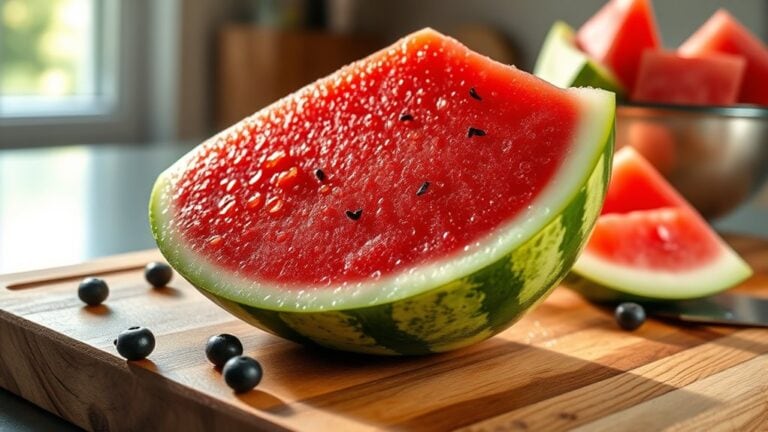Coconut water contains natural sugars like glucose, fructose, and sucrose, giving it a mildly sweet taste. The amount varies—younger coconuts have less sugar, while riper ones taste sweeter. Compared to soda or juice, it’s still lower in sugar, but some brands add sweeteners, so checking labels matters. For those watching sugar intake, unsweetened, raw coconut water is the best choice. The bigger question remains: how does this natural sweetness impact health differently than refined sugars?
Natural Sugar Content in Coconut Water
Coconut water contains natural sugars, though the amount varies depending on the type and ripeness of the coconut. Young, green coconuts tend to have a milder sweetness, while mature ones pack more natural sugar.
The primary sugars are glucose, fructose, and sucrose, which contribute to its natural sugar composition. Unlike refined sugars, these are absorbed slower due to coconut water’s electrolytes and fiber, affecting the sugar absorption rate. This makes it a gentler option for those mindful of blood sugar spikes.
However, since natural sugars still count, moderation matters—especially for those tracking sugar intake while enjoying coconut water’s hydrating benefits.
Comparing Coconut Water to Other Beverages
As the [ORIGINAL TEXT] is inspected, coconut water emerges as a notable option due to its inherent sugars and electrolytes, but how does it compare against other beverages?
- Sports drinks: Often higher in added sugars, while coconut water offers natural sweetness and similar hydration properties.
- Soda: Lacks nutrient density comparisons—coconut water provides potassium and magnesium without artificial additives.
- Juices: Higher in sugar and calories; coconut water has fewer carbs and more electrolytes.
- Plain water: Superior for hydration but misses coconut water’s mild sweetness and minerals.
For balanced hydration, coconut water stands out among sugary or artificial alternatives.
How Processing Affects Sugar Levels
While many assume natural beverages like coconut water remain unchanged from tree to table, processing methods can substantially alter their sugar content. Raw coconut water contains natural sugars, but sugar extraction techniques like pasteurization or adding sweeteners can increase sugar levels.
Conversely, minimal processing methods, such as cold-pressing or flash pasteurization, help preserve its natural composition with no added sugars. Some brands dilute coconut water to reduce sweetness, while others concentrate it for flavor, impacting sugar concentration. Appreciating these processes helps consumers choose products aligned with their preferences, ensuring they get the nutritional profile they anticipate from this hydrating drink.
Health Implications of Coconut Water Sugar
Surprisingly, the way coconut water is consumed can alter its health effects. While natural coconut water contains simple sugars, comprehension of its impact aids in making wiser choices.
Nutrition label analysis: Checking labels reveals added sugars, which can spike blood sugar levels compared to pure, unsweetened varieties.
Sweetener alternatives: Some brands use artificial or natural sweeteners, which might affect metabolism differently than the natural sugars in fresh coconut water.
Hydration vs. sugar intake: The electrolytes in coconut water benefit hydration, but excessive consumption could lead to unwanted calorie buildup.
Portion control: Moderating intake balances benefits without overloading on sugars.
Awareness of these factors guarantees coconut water remains a healthy choice.
Choosing the Right Coconut Water for Low Sugar Intake
Comprehending how coconut water affects sugar intake leads directly to selecting the best options for those aiming to keep their consumption low. Opt for reduced calorie options, which often contain less natural sugar per serving. Minimally processed varieties preserve nutrients without added sweeteners.
Check labels for terms like “unsweetened” or “no sugar added” to avoid concealed sugars. Younger coconuts tend to have lower sugar content than mature ones. Diluting coconut water with plain water can further reduce sugar intake. Prioritizing these choices guarantees hydration benefits without excess sugar, making it easier to maintain balanced dietary habits.
Conclusion
Coconut water naturally contains sugars, but in moderation, it’s a better choice than processed drinks. One interesting fact: an 8-ounce serving of raw coconut water has about 6 grams of sugar—roughly half that of orange juice. Though it’s not sugar-free, its natural hydration benefits make it a smart option for active lifestyles. Always check labels, as processed versions can sneak in extra sweeteners. For most, enjoying it occasionally fits well within a balanced diet.




